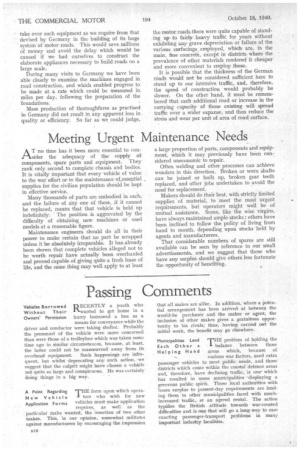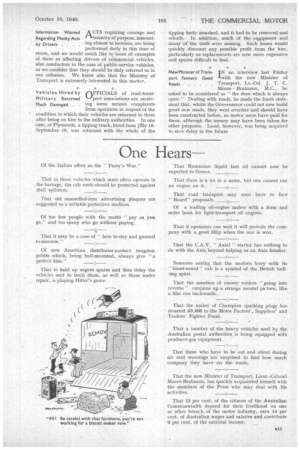Passing Comments
Page 44

Page 45

If you've noticed an error in this article please click here to report it so we can fix it.
Vehicles Borrowed 1QIIECENTLY a youth who Without Their "wanted to get home in a Owners' Permission hurry borrowed a bus as a means for conveyance while the driver and conductor were taking shelter. Probably the personnel of the vehicle were more concerned than were those of a trolleybus which was taken some time ago in similar circumstances, because, at least, the latter could not be manceuvred away from its overhead equipment. Such happenings are infrequent, but whilst deprecating arty such action, we suggest that the culprit might have chosen a vehiele not quite so large and conspicuous. He was certainly doing things in a big way.
A Point Regarding HE form upon which opera N eW Vehicle 4 tors who wish for new
Application Forms vehicles must make application requires, as well as the . particular make wanted, the insertion of two other makes. This, in our opinion, somewhat militates against manufacturers by encouraging the impression that all makes are alike. In addition, where a potential arrangement has been arrived at between the would-be purchaser and the maker or agent, the inclusion of other makes gives a gratuitous opportunity to his rivals; thus, having carried out the initial work, the benefit may go elsewhere.
Municipalities Lend THEproblem of holding the
Each Other a balance between those Hel p i ng Ha nd areas which, because of
various war factors, need extra passenger vehicles to meet public needs, and those districts which come within the coastal defence areas and, therefore, have declining traffic, is one which has resulted in some municipalities -displaying a generous public spirit. Those local authorities with buses surplus to present-day requirements are lending them to other municipalities faced with muchincreased traffic, at an agreed rental. The action typifies the British attitude towards war-created difficulties and is one that will go a long way to ease exacting passenger-transport problems in many important industry localities. ACTS requiring courage and tenacity of purpose, amounting almost to heroism, are being performed daily in this time of stress, and we would much like to learn of examples of these as affecting drivers of commercial vehicles, also conductors in the case of public-service vehicles, as we consider that they should be duly referred to in our columns. We know also that the Ministry of Transport is extremely interested in this matter.
Information Wanted Regarding Plucky Acts by Drivers . . . .
Vehicles Hired by nFFICIALS of road-transMilita ry Returned ‘-'port 'associations are receivMuch Damaged . . ing some serious complaints
from operators in respect of the condition in which their vehicles are returned to them after being on hire to the military authorities. In one case, at Plymouth, a tipping truck, hired from JIlly 18September 18, was returned with the whole of the tipping body smashed, and it had to be removed and rebuilt In addition, much of the equipment and many of the tools were missing. Such losses would quickly discount any possible profit from the hire, particularly as replacements are now more expensive and spares difficult to find.
New Minister of TransIN an interview last Friday port Favours Good with the new Minister of
Roads Transport, Lt.-Col. J. T. C.
Moore Brabazon, M.G., he asked to be considered as " the door which is always open." Dealing with roads, he made the frank statement that, whilst the Gervernment could not now build great new roads, they were overdue and should have been constructed before, as motor users have paid for them, although the money may have been taken for other purposes. Land, however, was being acquired to save delay in the future




































































































